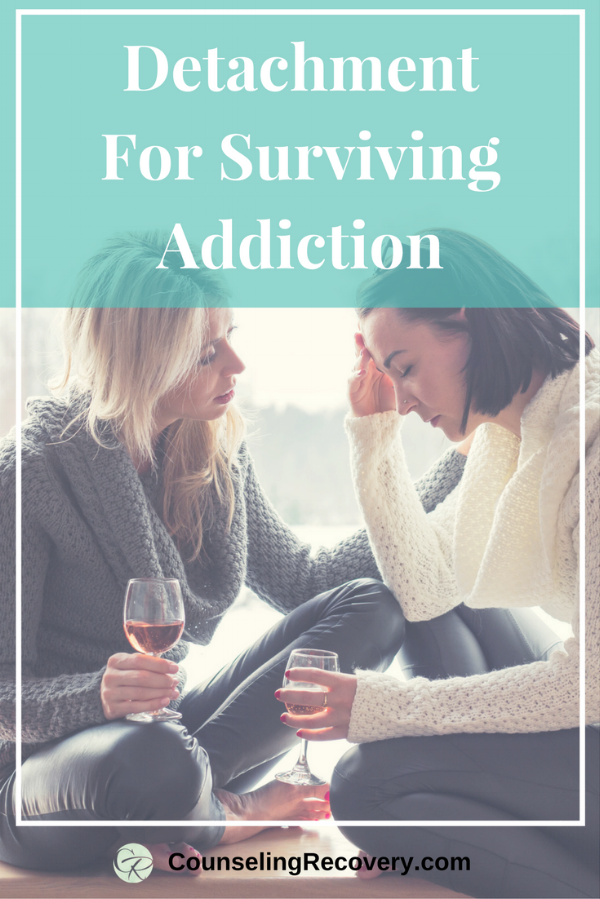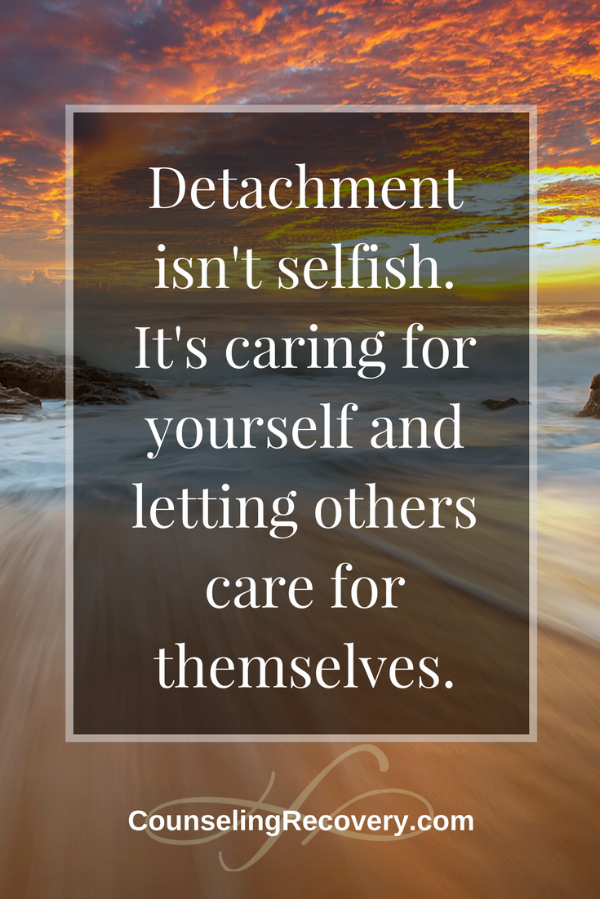Detachment for Surviving Addiction
You're tired of living with an addict but can't leave. It's so painful and you don't know what else to do. But there is a solution - you can regain your sanity by practicing detachment.
What is Detachment?
Detachment for self-care and preserving relationships
Detachment is letting another person experience their consequences instead of taking responsibility for their problems.
You choose to focus on yourself rather than rescuing others. This helps whenever you're trying to change or stop someone else's behavior.
Detachment doesn't mean you stop caring. It means lovingly letting go of solving the problems associated with the addiction. It's not participating in the chaos.
Whether it's missing work, neglecting personal commitments and self care, leave the alcoholic's problems alone.
Trying to Control
By taking responsibility for the addict's behavior, you prevent them from experiencing consequences that could lead to hitting bottom. Sadly, there are no guarantees of sobriety but detaching can restore sanity in your home.
There is often an overwhelming fear that if you detach, the addict will die. This intense powerlessness is the hardest part. There's an Al-Anon saying,
"You didn't cause it, you can't control it and you can't cure it."
You're not responsible for the addict's behavior. It takes a lot of effort to let them have their consequences. With the right support, it gets easier.
In this article you'll learn valuable tools to minimize the impact of addiction.
Dealing with active addiction is incredibly frustrating and can trigger intense feelings.
Detaching helps with:
Active addiction
Non-violent acting out behavior
Annoying habits and embarrassing behavior
Situations you want to control but can't
Examples of Detachment:
Not making excuses for them
Letting them handle their own problems
Not riding in a car with them when drinking
Removing yourself and children before they become violent
Stop provoking arguments (or responding) to get them to stop
Accepting that you are powerless over someone else's behavior
What makes detaching so difficult?
Assuming something bad will happen
Thinking you know how to fix it
Feeling overly responsible for the outcome
Not trusting that anything will change
Not having the support or tools to practice it
The Pain of Addiction
When you try controlling the addiction, problems get worse - for you. The addict thinks everything is fine and doesn't see a problem.
This happens because the brain gets hijacked by the substance and impacts the ability to think and make decisions. These physiological changes make it impossible for the addict to see what's happening to them.
Alcoholism is a disease not a moral issue. Once the addict uses the addictive substance, they are no longer at choice.
The stress of trying to control the addiction is exhausting. Anxiety, depression, excessive people pleasing, poor self care and feeling like a "human doing" are signs of families with addiction.
If they'd only stop using, everything would be okay, right?
The problem is that no matter what you do, it doesn't get the addict/alcoholic sober. Even if they stop drinking, the problems are still there. It takes working a recovery program for the entire family for healing to occur.
Click here to check out my Codependency Workbook - A Guide to Being Your Best Self.
How to Start Recovery
Recovery may include substance abuse treatment, individual & family counseling and 12 step programs like Alcoholics Anonymous and Al-Anon.
It's common for the families get help before the addict. Not forcing treatment gives the addict the dignity to decide on their own. Hiring a professional to conduct an intervention provides additional support when the addict is out of control.
If you're tired of being sick and tired there is a wonderful resource in Al-Anon. It's a free support group that supports families struggling with addiction. They also have Ala-Teen, groups for young children effected by addiction. For More on 12 Step programs click here to read Busting the Myths of 12 Step Programs.
Tips on How to Start Detaching
Silence helps. Before speaking ask yourself, how important is it?
Recognize that helping doesn't work.
Do something for YOURSELF instead. Go to the movies, go exercise, distract yourself!
Refrain from giving advice or getting in the way of their use.
Leave the room if you have to. It will save your sanity in the long run.
Keep children safe by minimizing exposure when necessary.
If you’re not comfortable in groups, that's okay. Talking about what's happened is painful and embarrassing. Seeking individual or family counseling can give you a safe place to get started.
How would detachment help your situation? Please add it in the comments below, I'd love to hear from you.
If you're wanting information on codependency counseling, click here.


